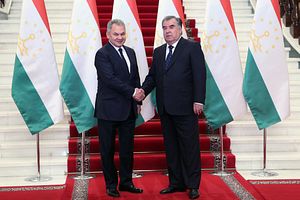On May 28, Russian Defense Minister Sergei Shoigu paid a visit to Tajikistan. Shoigu’s visit came exactly a week after the head of Russia’s Federal Security Service (FSB), Alexander Bortnikov, trod a similar path to Dushanbe for talks with Tajik leaders. The visits underscore the importance Russia places, in security terms, on Tajikistan.
According to TASS, Shoigu was expected to discuss modernization plans for the Tajik armed forces and Russia’s 201st Military Base. Russia has troops stationed at two facilities in Tajikistan — Dushanbe and Bokhtar (formerly Qurghonteppa) — although they are collectively referred to as Russia’s “base” in the country. In addition, there had been a Russian garrison in Kulyab, about 25 miles from the Afghan border, but the troops there were reportedly relocated in late 2015 to Dushanbe. The 2012 lease agreement under which roughly 7,000 Russian troops are stationed in Tajikistan runs to 2042.
Rossiyana Markovskaya, a spokeswoman for the Russian defense minister, told reporters, “The main topics of the negotiations will be equipping the Russian military base on the country’s territory with new weapons and modernization of the Tajik armed forces.” Shoigu was also set to meet with Tajik President Emomali Rahmon.
Last week, FSB chief Alexander Bortnikov was in Dushanbe. He issued an on-brand but nonetheless concerning warning that extremists, specifically from the Islamic State, were amassing in Afghanistan’s north. Bortnikov stressed the importance of border security to prevent the ever-threatened spillover. For Russia, the Afghan border with the states of Central Asia — Turkmenistan, Uzbekistan, and Tajikistan, specifically — is really the border between the Commonwealth of Independent States (CIS, a grouping of post-Soviet states) and Afghanistan. Viewed through that lens, when Tajikistan is at risk, so too is Russia. The U.S. military has estimated that there are about 2,000 fighters affiliated with the regional iteration of the Islamic State in Afghanistan; meanwhile, Bortnikov cited a “redeployment” of about 5,000 Islamic State fighters to northern Afghanistan. While the comment ginned up breathless coverage from some quarters, regional security analysts have long argued that Russia is exaggerating the threat posed by the Islamic State in Afghanistan in order to justify its outreach to the Taliban.
As Shoigu visited Tajikistan, back in Moscow representatives from the Taliban gathered for peace talks. As the Washington Post reported, Taliban and Afghan politicians met in the Russian capital to advance talks, but the process underway in Moscow this week is separate from the U.S. track of negotiations with the Taliban — and both lack the direct involvement of the Afghan government. Former Afghan President Hamid Karzai was among the Afghan representatives, and Abdul Ghani Baradar, a co-founder of the Taliban released from a Pakistan prison last year and now head of the group’s political office, was the Taliban’s frontman in Moscow.
Both Baradar and Russian Foreign Minister Sergei Lavrov called for the total withdrawal of foreign forces from Afghanistan, using separate language with the same ultimate meaning.
“We are calling for a total pullout of foreign forces from the country,” Lavrov said in his welcoming remarks.
“The Islamic Emirate is firmly committed to peace, but the first step is to remove obstacles and end the occupation of Afghanistan,” Baradar said when his turn to speak came.
Returning to Tajikistan: While Russian officials may be urging foreign countries, i.e. the United States, to withdraw from Afghanistan, they remain deeply concerned about regional stability. The recent visits to Dushanbe by the FSB chief and the defense minister, while not unusual, nevertheless clearly underscore this concern. Tajikistan is Russia’s bulwark against the chaos of Afghanistan.

































